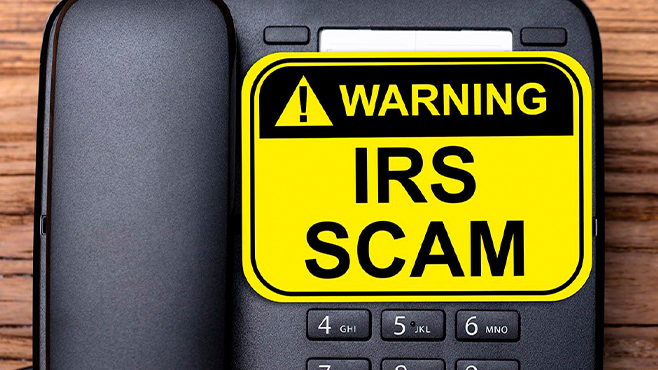How to avoid getting tricked by an IRS scam
To protect yourself from financial scams and keep your personal information secure, it's important to stay aware and take action against any suspicious activity.
As tax season arrives, it's also important to be aware of IRS scams. These can take many forms, including phishing emails and fake phone calls, and can be difficult to spot. Shockingly, over 100,000 people fell victim to IRS scams in 2022, resulting in the theft of over $50 million.
That's a significant amount of money that could have been used for savings, investments, or other important expenses. To avoid falling victim to these scams, it's essential to know some IRS scams and take precautions to protect yourself. With a little bit of knowledge and caution, you can safeguard your personal and financial information.
Protecting yourself from IRS scams is crucial during tax season. Here are the most common IRS scams you should know about to help to protect your personal and financial information. These scams can be tricky, so it's important to stay alert and follow the tips to reduce your risk of becoming a victim.
Phishing emails: Scammers often send phishing emails that appear to be from the IRS or other reputable organizations. These emails may contain links or attachments that download malware onto your computer, potentially stealing your personal and financial information. To protect yourself, never click on links or download attachments from unexpected emails, and be suspicious of emails that ask for personal or financial information.
Fake phone calls: Be cautious of fake phone calls from people claiming to be IRS agents. They may demand immediate payment or threaten you with arrest, which are tactics the IRS never uses. If you receive a call like this, hang up and report it to the Treasury Inspector General for Tax Administration.
Social Security scams: Scammers may pretend to be from the IRS or other government agencies to steal your social security number. The IRS will never ask for your social security number over the phone. If you receive a call like this, hang up and report it to the Federal Trade Commission.
Return preparer fraud: Dishonest tax preparers may claim false deductions or credits to increase your refund, which could lead to you owing back taxes, fines, and penalties. To avoid this, choose a reputable tax preparer, review your tax return before signing it, and never sign a blank return.
Inflated refund scams: Scammers may promise you a larger refund than you're entitled to and charge you a fee for this service. Don't fall for promises of inflated refunds, and be wary of anyone who charges a fee based on a percentage of your refund.
Falsifying income to claim credits: Scammers may ask you to falsify your income to claim credits or benefits that you're not entitled to, which can lead to back taxes, fines, and penalties. Never agree to falsify your income, and be careful who you trust with your personal and financial information.
Charitable organizations scam: During tax season, scammers may try to deceive you by pretending to be from a charitable organization and asking for donations. They might use the name of a fake charity or create a fraudulent website that looks like a legitimate one. To avoid falling victim to this scam, it's important to research any charity before making a donation, and to be cautious of charities that do not provide detailed information about their mission or how they use donations.
Gift card scams are a common tactic used by scammers to steal money from unsuspecting individuals. In this type of scam, the scammer will ask you to pay them using a gift card, claiming that you owe taxes. They may specify a particular type of gift card, such as a prepaid debit card or a store gift card, and request that you provide them with the card number and PIN. Once you do this, the money is gone, as it is nearly impossible to recover funds from a compromised gift card. Remember that the IRS will never ask you to pay your taxes using a gift card, so if you receive a request like this, hang up and report it to the
Treasury Inspector General for Tax Administration
Tax collection scams are another type of scam that people should be aware of. Scammers may contact you and threaten to arrest you or seize your property if you do not pay back taxes immediately. It's important to remember that the IRS will never threaten you in this way. If you receive a call like this, hang up and report it to the Treasury Inspector General for Tax Administration.
Non-filing scams are yet another tactic used by scammers. Some may try to convince you that you do not need to file a tax return or that you can get a larger refund by not filing. This is not true! Failing to file a tax return can result in back taxes owed, as well as fines and penalties. To avoid this scam, always file a tax return, even if you do not believe you owe any taxes.
By staying vigilant and taking necessary precautions, you can protect yourself from tax scams and safeguard your personal and financial information.
To avoid becoming a victim of IRS scams, it's essential to be informed and cautious. By following these simple tips, you can protect yourself and your family from these fraudulent schemes:
- Be cautious of unsolicited communication from someone claiming to be from the IRS, especially through email or phone calls.
- Avoid clicking on links or downloading attachments from unknown sources, as these may contain malware.
- Never give out your personal or financial information, such as social security numbers or bank account details, to anyone who contacts you claiming to be from the IRS.
- Choose a reputable tax preparer and review your tax return before signing it, and avoid preparers who promise inflated refunds.
- Don't fall for promises of inflated refunds, and don't agree to falsify your income.
- Research before donating to a charity and be wary of charities that do not provide detailed information about their mission and how they use donations.
- Do not pay taxes using gift cards, as the IRS will never ask you to do so.
If you suspect that you have been a victim of an IRS scam, report it immediately to the Treasury Inspector General for Tax Administration or the Federal Trade Commission. Remember, being informed and cautious is the key to reducing the risk of becoming a victim of an IRS scam and protecting your personal and financial information.






